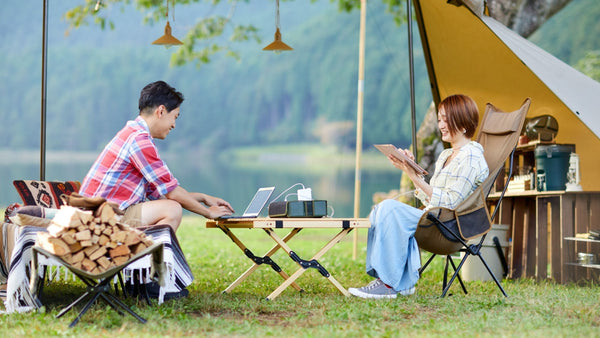Camping in Japan for Beginners: Top Locations, Rental Gear & Travel Tips

Jump to:
Camping in Japan is a lot of fun. The combination of the nation’s rich natural beauty, with its safe, relaxing, and hassle-free campsites, opens up a hobby that has such a small barrier to entry.
If you’re travelling in Japan and want to escape the noise of the city, immerse yourself in serene forests, or enjoy a cozy lakeside retreat, Japan offers a wide range of camping options that suit all kinds of people.
From glamping in luxurious tents with electricity, a chef-prepared meal, and all the amenities you could ask for, to sleeping in a one-man tent on a mountain somewhere, no matter which scenario you choose, you will be treated to tranquility and stunning views.
This article will walk you through the types of camping in Japan, legal considerations, popular locations, and what you need to know about camping culture and activities to make the most of your outdoor experience here.
Types of Camping in Japan
Japan’s camping scene offers something for everyone, from glamping resorts to wild campsites, log cabins, and everything in between. Many options even allow you to come empty-handed, as they’ll happily provide everything for you.
Glamping

Glamping, or "glamorous camping," is an increasingly popular choice for those who want to experience the great outdoors without sacrificing comfort. Glamping sites can be far away in the mountains and forests, but are typically attached to resorts and other outdoor-focused hotels, like Nesta Resort in Kobe. Expect fully-equipped tents, typically yurts, with plush bedding, electricity, and sometimes even private bathrooms.
Glamping is certainly not cheap, and typically even more expensive than a hotel room. But it’s all about the experience. You’ll have a delicious meal with premium ingredients, the most gorgeous natural views, and some even offer massages, onsen baths, and more pampering activities.
Traditional Campsites

Traditional campsites are abundant throughout Japan, as the vast majority of the nation is surrounded by untamed nature. In areas like Kyoto, Hyogo, Shiga, and Shikoku, you’re probably going to find the most, but really, you’re going to have options everywhere you go.
These campsites typically have marked plots, or raised wooden platforms, for you to set up your tent, and public bathrooms, coin-operated showers, and barbecue areas. At these campsites, you’re pretty much left to your own devices, but many also offer experiences to try, such as guided hikes, fishing, and kayaking.
These campsites charge 2,000-3,000 yen per night for a basic plot. At that price, you need to bring your own gear, so make sure to pack the essentials: cutlery, cookware, and portable chopsticks are great choices!
Most campsites also offer tent and gear rental, food, and anything else you might need for a fee. Often, you can camp empty-handed, renting everything you need, for under 10,000 yen.
If you’d rather save money, plan in advance and bring your own gear. Japanese camping gear is some of the highest quality in the world. To get you started, here’s a checklist.
Rental Tents & Camping Gear

For those who don’t have camping gear but still want to experience Japan’s outdoors, many campsites offer gear rentals. This includes everything from tents to cooking equipment. This is ideal for travelers or first-timers who don’t want to invest in equipment for just one trip.
The prices vary dramatically depending on the site. Popular, more modern campsites rent tents, bedding, and barbecue sets for around 8,000 yen, and sell charcoal and food on top of that.
At an older, more secluded location, you may spend less than 4,000 yen for the same set. But in either case, it’s not a lot of money, and it allows you to camp totally empty-handed.
Rental Cabins & Bungalows

For families, couples, or anyone looking for a little more comfort, rental cabins or bungalows can be a great option. These units are weatherproof, cozy, and typically come with heating, making them perfect for winter camping. They offer a more homely feel while still being surrounded by nature.
Most Japanese campsites have one or two cabins or bungalows, and some campsites specialize in them, offering dozens of options of varying sizes and price points. Expect to spend anywhere from 8,000 to 25,000 yen for the night.
The best thing about camping in cabins in Japan is that, unlike hotels, they typically don’t charge per person (though they may have occupancy limits), so if you’re travelling in a group, renting an 8-10 person cabin for 25,000 yen is a bargain!
Can You Camp Anywhere?
Wild camping in Japan isn’t as straightforward as it might be in some other countries. While technically there are no laws that completely ban wild camping, it’s important to be mindful of where you set up camp.
Camping on national park land, near shrines, temples, or on private property is forbidden. Japan has a strong cultural tradition of respect for nature and private property, so it’s essential to avoid areas where you don’t have explicit permission to camp.
If you exclude national parks and private property, there aren’t that many options left. So we certainly don’t recommend it. It’s not a common practice in Japan, and it may cause significant misunderstandings.
Can You Sleep in Your Car in Japan?
For the most part, yes, you can sleep in your car in Japan, and many locals do it while on road trips or exploring more remote regions.
This certainly isn’t common outside of certain specific facilities, though. If you’re wandering about after dark, you’d be hard-pressed to find anyone sleeping in their car. And if you parked your car outside of someone’s house, in a supermarket or convenience store parking lot, or an hourly parking space and set up for the night, you’d likely be breaking the law, and someone might call the police.
However, there are two places where camping in your car is extremely common. The first is michi-no-eki (rest areas), which are typically located in the countryside between cities, and provide convenient spots where you can park and sleep overnight. They’re usually equipped with bathrooms and vending machines, and are well-maintained. But after dark, they don’t feel as secure as our second option.
The most secure place to camp in your car is at highway Service Areas and Parking Areas. As most of these are only accessible by toll roads, you’re not going to have random people wandering around. Everyone who’s there is likely there for the same reason you are. Some larger Service Areas are open 24/7 and have convenience stores, restaurants, bathrooms, and coin-operated showers on-site. They’re free (aside from the toll to use the road), well-lit, and feel extremely safe.
If you park at a Service Area or Parking Area after 10 pm, you’ll probably see a dozen or more other people sleeping in their cars, so you won’t feel alone either.
That said, there are a few rules to keep in mind. Be sure to stay quiet and respectful of the space, avoid littering, and remember that these areas are not meant for extended stays–stay for one night, then move on.
Camping Laws and Unspoken Taboos
When it comes to camping in Japan, respect for the environment and fellow campers is paramount. Most campsites have clear rules regarding fire safety, waste disposal, and the hours for noise and campfires. Violating these rules can lead to fines or even being asked to leave the site.
In most cases, you will be asked to bring your garbage home with you or pay a fee for the site to dispose of it. Typically, you will hear the campsite start to get quiet at around 10 pm or so, at which point it’s best to turn off any music and keep your voices low.
Best Camping Spots in Japan
Japan is home to some of the most stunning and diverse camping locations in the world. Here are a few of the best spots to check out:
Fujigoko (Yamanashi)

The five lakes around Mt. Fuji are filled with gorgeous campsites with incredible views of the mountain. As many travellers to Japan plan to visit Mt Fuji, a lot of these campsites are easily within reach and are totally accessible for foreign travellers.
Tamba (Hyogo)

Tamba and Hyogo, in general, are packed with campsites and are a bit of a camper’s paradise. In Tamba and the surrounding region, such as Tamba-Sasayama, Fukuchiyama (Kyoto), and Taka, you will find glamping sites, campsites, and cabins for all interests and price points.
Lake Biwa (Shiga)

Lake Biwa is Japan’s largest lake, and its 235km circumference is littered with campsites. Lake Biwa’s campsites typically offer many more fun activities than other areas, such as bass fishing (the world’s largest largemouth bass was caught here!), windsurfing, and much more.
Awaji Island

The little island that connects Hyogo to Shikoku is full of campsites, thanks to its vast, flat land and access to the sea. These campsites are heavily geared toward ocean fishing, and some even have stocked fishing areas!
Okinawa Islands

For a tropical camping experience, Okinawa’s beachside campsites offer the chance to sleep under the stars with the soothing sound of ocean waves. Ideal for those looking to relax by the beach.
Fun Camping Activities in Japan
Camping in Japan isn’t just about setting up camp and relaxing. There are plenty of activities to keep you busy:
- Hiking & Nature Walks: Many campsites are located near beautiful trails, making hiking a favorite activity. If you get up early enough, you may also see some wild shika deer! But be careful to stick to the path, and bring a bear bell in certain places.
- Fishing: With so many lakes, rivers, and coastal areas, fishing is a popular activity. Whether you’re into freshwater fishing or want to try your hand at catching fish from the sea, there are plenty of opportunities.
- Barbecue: Japan has a vibrant barbecue culture, and many campsites provide charcoal grills for rent. Grilling fresh beef and vegetables while surrounded by nature is an essential part of camping in Japan. If you want a really unique barbecue experience, this Japanese wood fire stove can easily be packed up and carried to the campsite!
Camping in Japan offers a safe, fun, and memorable way to experience the country’s natural beauty. Whether you're new to camping or a seasoned pro, there’s something for everyone, from luxury glamping to off-the-grid mountain escapes.
Be sure to respect nature, follow local guidelines, and always keep the environment clean. No matter where you go, camping in Japan will make for a trip you’ll never forget.

0 comments